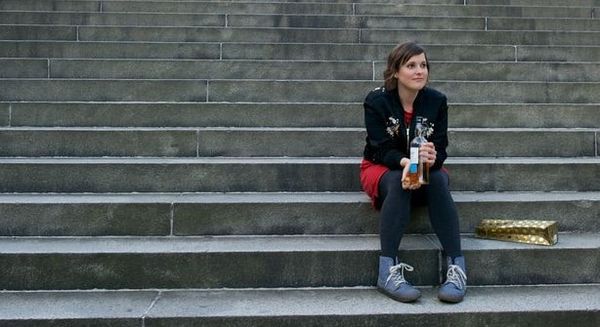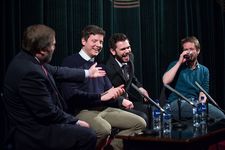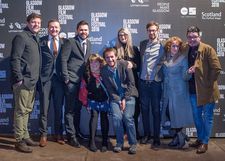 |
| Josie Long in Super November |
Eye For Film saw Super November at its world première, in a packed cinema at the Glasgow Film Theatre. The capacity crowd for the sold out screening included all of the stars who could make it, though writer and star Josie Long was unable to attend because of the lingering after-effects of The Beast From The East. The crowd were in good spirits, giving the film a warm reception despite the cold outside.
Director Douglas King spoke briefly beforehand, saying that he "[wouldn't] give it an introduction as it'd be mostly disclaimers". He thanked Josie as a "brilliant collaborator", said that he hoped he "hadn't put [the audience] off already", and asked us to "please enjoy the film and don't heckle". We did both.
 |
| Allan Hunter talks to Douglas King, Sean Biggerstaff and Darren Osborne Photo: Glasgow Film Festival |
This appeared to come as some relief to King, who revealed that he'd been wearing his fitness tracking bracelet throughout, and that it had been pegged to "about 130 through the whole thing". The Q&A was raucous, good-spirited; hosted by festival co-director Allan Hunter, Sean Biggerstaff and King were joined some questions in by Darren Osborne.
Douglas was asked about his inspirations, and he explained that at around the age of nine he read Robert Rodriguez' book (Rebel Without A Crew) and since then wanted to make feature films. At one point he had to be reassured by Allan that "the answer was fine, the question is irrelevant", but he wasn't the only one with stories to tell. Sean Biggerstaff recalled encounters with Josie at gigs, other meetings, and how when she DM'd him on Twitter to ask him to be in her film he thought it "lovely that she remembered." "She hadn't", he explained, and it was revealed that Josie had just been tweeting folk in the Glasgow area who might be in her film. One of them was Janey Godley, whose Diana-obsessed Donna is an improvisatory gem - contributing from the opening crowd she explained some of her motivations (her own feelings for Diana are much stronger than those of Donna, and quite, quite different) and her discovery that daughter Ashley Storrie was also in the film. She hadn't been aware until the day of the screening, a revelation which made more sense as the films production was explained. There's already a suggestion that there might be a longer, swearier director's cut, one where Janey's love for swearing is given reign by the scripting, a setup she found easier to work with as a comedian.
The film's production was split - some questions from the audience made reference to the film's two parts, and Janey had complained that she thought she was missing an element of the film - that to her (and Eye For Film agrees) it was one story. Those perceived parts separated only by time and a title card, were shot separately. Forced in part by budgetary constraints (Douglas explained that "Josie put up a little bit of money and [he] put in a bit less"), aided by volunteers (he explained that there were a lot of the same surnames in the credits) and that "any extras you see are crew," filming was split. There were some advantages, apparently, in edit - but other difficulties. As it was put, it meant phasing production, but that led to "fighting fires you shouldn't need to put out". It did help in other ways. King said that as a director he could "sleep at night asking for a few days at a time" rather than the weeks a more conventional arrangement might require, adding "if we had money we'd feel responsibility", with the creative freedom afforded by not being able to afford anything else, with plenty of swearing, "crazy risks with structure." He'd wondered if they'd gotten away with them, and Eye For Film can only offer assurance that they have.
 |
| Douglas King, Sean Biggerstaff, Darren Osborne, Janey Godley and friends on the red carpet Photo: Glasgow Film Festival |
Filming in two phases did have consequences for the cast - Sanjeev Kohli's role was meant to follow a longer arc, but despite the happy opportunity afforded by being able to bother football strips, even a select 11would have trouble competing with River City. That a tyrannical regime in a Potemkin village on the Clyde might steal away Glaswegians is perhaps life imitating art.
The timing of production had some awkward coincidences - filming for the first phase ended on the day of the Brexit vote, for the second after the US Presidential Election. There were concerns that some lines in the film might already be out of date, but it works. The audience asked about "that left turn", and there was discussion of rewrites to make it clearer. The presentation of it works really well (social media, sports discussion, poster campaigns all give lots by implication), and the audience were surprised but not thrown by it. There are other surprises, some of which were intended to serve as a "helpful reminder that it was a comedy". King was also asked about who had seen it - some, most, of the cast only saw the film at its debut. He'd apparently shared rough versions with other directors, but after sending a link to his mum there was an awkward phone call a few hours later when she said that she "didn't want to lie to [him]".
With a lot ad-libbed, the editing process made a lot of the film work. Written by a comedian, with comedians scattered through the cast, there were actors from all kinds of experience. Some liked the comfort of a script, others felt a connection to the story that helped them to ad-lib. Some elements had further consequences - an attempt to integrate a certain photo into a display was brought about by Janey Godley, and at least one part of the ending was apparently the consequence of a decision on the day.
I spoke briefly afterwards to Janey Godley, who was wearing her daughter's Star Trek jacket as it was apparently warmer than much of her own - I'd wondered if her observation that the film didn't feel like two halves was from her perspective as a comedian, in the sense that setup/punchline from a joke are part of a complete set. She repeated that it felt like a single story, that even with the gap it felt like a continuation - something reflected in the film's production, even if that phase started in Tradestone. She'd exclaimed during the Q&A that others' reaction had her fealing like she'd "fucking missed half a film", but she hadn't - she's one of many parts of Super November that make it entertaining.
Douglas got his start in short films, including ones that I've managed to miss at previous Glasgow Short Film Festivals. Short film is an incubator for talent, microbudget a display of ingenuity, and there's plenty of both display here. Super November's premiere was one of the last events of the 2018 Glasgow Film Festival, and Eye For Film's festival coverage continues. We're not done with Glasgow Film yet, however. The Short Film Festival starts in a couple of weeks and we'll be there - hopefully, you will be too.





















